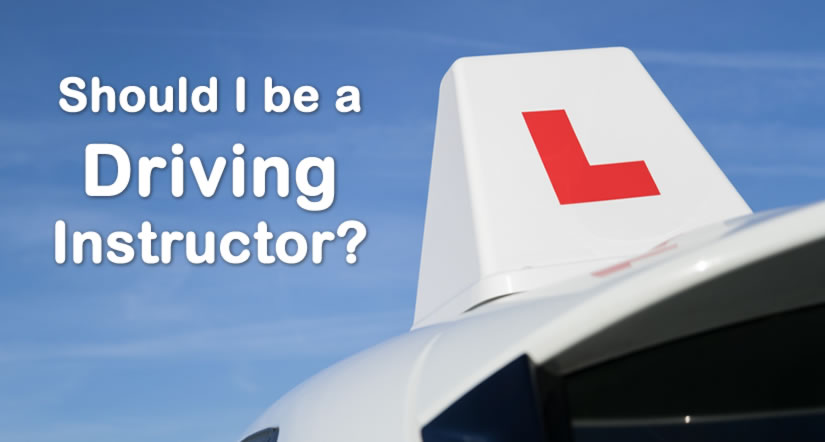Should I Be a Driving Instructor?
Should I Be a Driving Instructor?
As with any career, there are positives and negatives and to be successful, it requires dedication and hard work. There are different ways of being a driving instructor; there are those that prefer to work under another driving school’s name and there’s those that prefer to be completely independent and run their own business.
There’s advantages and disadvantages to both, but what we shall do is to answer some of those questions to hopefully help you decide whether or not you should be a driving instructor.
Are you Eligible?
Before we get into helping you decide whether to be a driving instructor, you first need to determine whether you’re eligible. First take a read of:
Training Time and Costs
Taking the intensive instructor training route, it can take anywhere from 2 months to become a fully qualified ADI (Approved Driving Instructor), or if you prefer the more traditional part-time training, it can take from anywhere between 6 to 24 months.
After passing the part 2 driving ability test, you can apply for a trainee driving instructor’s licence and become a Potential Driving Instructor (PDI). Being a PDI allows you up to 6 months on-road training experience, so if you intend on doing this, it may extend the duration before becoming a fully qualified ADI.
Costs will of course vary depending on the training provider of your choice and how many exam attempts you require. If you estimate your costs to be from between £2000 to £3000, then you shouldn’t go far wrong.
Being a Driving Instructor
If after going through the eligibility and training time and costs and are still asking ‘should I be a driving instructor’, we’ll now run through the roll of starting out as a driving instructor.
Starting Out as a Driving Instructor
Upon becoming fully qualified, you’ll be an ADI and if you wish to do so, it allows you to set up your own driving school. Realistically however, starting out as a driving instructor, almost all will work under an established driving school’s name by taking out a franchise with them.
Starting your own driving school takes time, business acumen and knowledge of the market, so a franchise is the ideal ‘quick fix’ for getting on the road and earning. But what exactly does a franchise get you?
A driving school franchise will vary from a basic agreement where they supply only leads (potential pupils for you to contact and arrange lessons with), but where you use your own vehicle. This extends up to a full franchise where the driving school provide you with a car (tax and insurance is included but not fuel), business cards, training manuals for the pupils and a certain amount of leads each week. Depending on the company, they may also run your diary and book pupils in on your behalf.
Franchise costs do of course vary depending on the package you choose. Anything from around £50 up to £250 per week is to be expected. On top of this, you’ll need to pay for your own fuel.
Fuel Costs

There’s many factors that determine how much you’ll need to pay for fuel; the current price per litre, how many hours you work per week, type of car (mpg) and how many miles you cover per week. For a 30 hour week, if you consider a fuel bill of between £80 to £120 per week, you’ll be somewhere along the right lines.
Running Your Own Driving School
As mentioned at the beginning, there are different ways of being a driving instructor. Some prefer to think of it simply as a job and remain to work under a driving school’s franchise. Taking this route typically means you’ll not earn as much as an instructor running their own established driving school, but it does mean you don’t have to put extra time and effort aside for building your own business.
Instructors that decide to run their own school will have greater control of almost all aspects of their career. They can choose what car they prefer to teach in, more control over the hours they work, setting the hourly lesson rate, incentives and discounts plus the general satisfaction of running and maintaining your own business.
Though there’s no franchise fee to pay, there are other costs which include the car, tax, insurance, fuel (which you’d still pay for on a franchise) website costs, printing, business cards, advertising.
Realistically, if you’ve no experience running your own business, then it’ll take two or more years to get off the ground. The best option here is to continue on a franchise until you have enough work coming in that your own business is generating.
Working Hours
Full time driving instructors work 30 or more hours each week; that’s 30 or more hours of actual paid tuition. Though don’t forget, a instructor needs to get from one lesson to another and this traveling time between lessons can seriously increase your overall time on the road. How much time depends on where you live and how your diary is managed.
As a driving instructor gains in experience, they’ll become more adept at booking in pupils to suit a particular location based on a previous pupil’s location. Booking in lessons so that pupils are located reasonably close to each other helps significantly, but for many instructors, this benefit only comes when their driving school is successful enough to allow them to pick and choose who goes where. Even then, you can’t have your own way all the time.
Instructors who are on a franchise and particularly instructors who have their diary managed for them by the franchise company are more likely to have longer traveling between lessons.
Realistically as a new instructor or starting your own school, your hours will be all over the place. You’ll probably start off early in the morning and finish in the evening and have some gaps of down time during the day where you couldn’t find a pupil to fit in.
Working Days Each Week
As a new instructor or an instructor who’s just started running your own school, you’ll be eager to take on each and every pupil that comes your way. Pupils will be all over the place, with long journey times between lessons; some can only take lessons certain times at certain days, while others can only do weekends or evenings. You’ll also have gaps in your diary where you are unable to fill a slot.
In all likelihood, you’ll probably be working (on and off) 6, perhaps 7 days per week. This is perfectly normal at the start so don’t worry. As you gain in experience and as your business progresses, you’ll work out a system that makes your diary flow much more efficiently. You’ll also find that over time, saying ”yes” to each and every request that comes your way is just not practical.
Dealing with the Public
People can be challenging and as a driving instructor, you’re going to be meeting many types of personalities. For this job, you really need to be able to get on with people and most of the time people are pleasant and polite.
Some pupils like to have a good laugh and chat during lessons which is perfectly fine providing it doesn’t deter from their learning ability and safety. Others however, aside from your instruction prefer to spend the lesson in silence. You’ll need to learn to read people’s personality quickly so to ensure they don’t get put off by coming back next time.
Try and remember that may learners are nervous when starting out driving and may come across as being ‘offish’, but after a few lessons and some friendly chat, they usually relax. You’ll also come into contact with individuals with mental health issues of varying degrees and developmental conditions such as autism, Asperger’s Syndrome etc.
On occasion, you’ll also meet someone you simply do not like. Some individuals can have an argumentative attitude where even though you’re the professional, they are always right no matter what. Sometimes you just need to bite your tongue to ensure you remain polite and professional – and that’s not always easy.
The Job
The job of a driving instructor involves a lot of sitting down, so if that’s not something you’re used to, then consider that you may put on weight and you may develop back aches. When starting out, your hours will be all over the place, so you need to try and fit in some exercise where possible.
The job can also be quite mentally tiring. You need to be thinking ahead at all times and predicting any potential hazards, then there’s the learners. Learners can be unpredictable and just as you think you can predict how an individual will drive, they do something totally random and potentially dangerous. So you need to be alert and focused at all times which can get quite draining after a day of it.
Your ability to teach with often throw up surprises. You’ll have a system that for 80 percent of pupils works great. But you’ll need a ‘plan b’ and possibly a plan c because there will be some pupils who just don’t get what it is you’re trying to teach. So don’t force them to understand you, instead be prepared to change your teaching method.

Income
Based on 30 hours of paid tuition, a driving instructor’s income is similar to the UK’s average annual income. The average hourly rate for an instructor is £25 and if we base that on 52 weeks of the year, that makes £39,000. That’s turnover though and being as driving instructors are self-employed, you’ll have expenses.
Expenses vary, but will mainly involve fuel for the car and if you’re working under another driving school’s name, the franchise fee. If you run your own driving school, you wont have a franchise to pay but instead advertising costs are likely to be quite high. Another large expense (if applicable) may be car rental or hire purchase monthly fee.
Deducting expenses from your turnover, you’ll be left with around £27,000. That’s gross profit and you need to pay tax and national insurance too. Of course, if you exceed 30 hours per week, or you’re in an area where you’re able to increase your hourly lesson rate and if you use a highly fuel efficient car, it’s quite possible to increase your annual salary.
